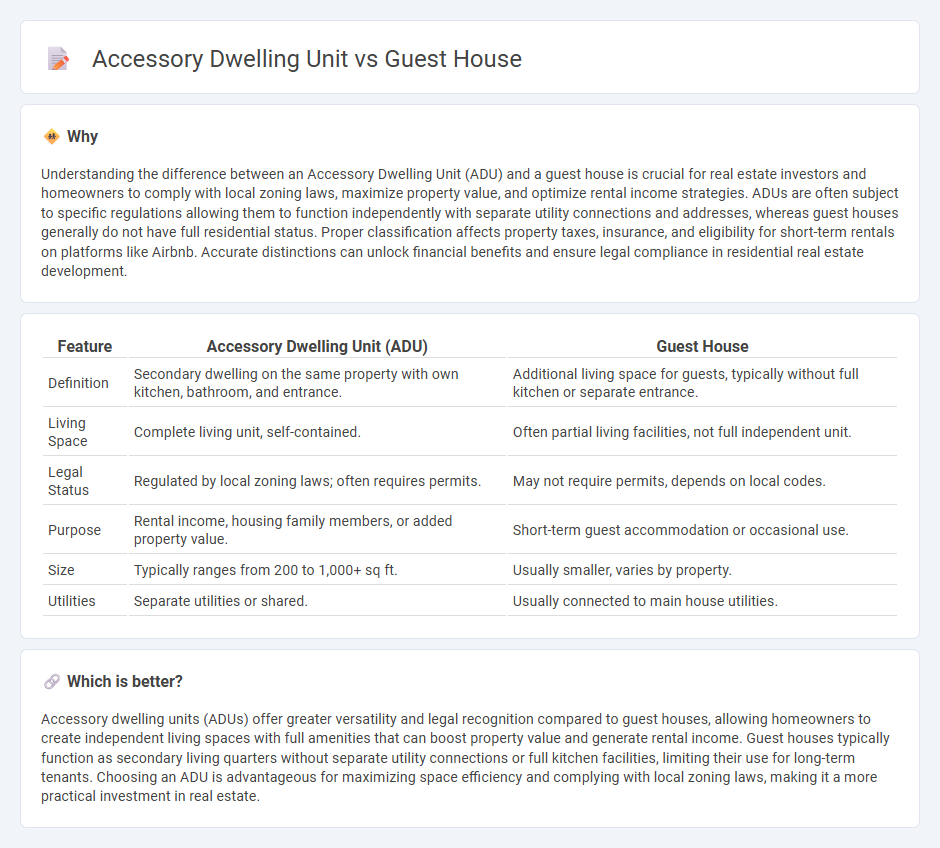
Accessory dwelling units (ADUs) are self-contained living spaces on a property that include separate entrances, kitchens, and bathrooms, designed for long-term occupancy. Guest houses typically serve as temporary accommodations without full facilities like kitchens, often used for visitors rather than permanent residents. Explore the key differences and benefits of ADUs versus guest houses to determine the best option for your property.
Why it is important
Understanding the difference between an Accessory Dwelling Unit (ADU) and a guest house is crucial for real estate investors and homeowners to comply with local zoning laws, maximize property value, and optimize rental income strategies. ADUs are often subject to specific regulations allowing them to function independently with separate utility connections and addresses, whereas guest houses generally do not have full residential status. Proper classification affects property taxes, insurance, and eligibility for short-term rentals on platforms like Airbnb. Accurate distinctions can unlock financial benefits and ensure legal compliance in residential real estate development.
Comparison Table
| Feature | Accessory Dwelling Unit (ADU) | Guest House |
|---|---|---|
| Definition | Secondary dwelling on the same property with own kitchen, bathroom, and entrance. | Additional living space for guests, typically without full kitchen or separate entrance. |
| Living Space | Complete living unit, self-contained. | Often partial living facilities, not full independent unit. |
| Legal Status | Regulated by local zoning laws; often requires permits. | May not require permits, depends on local codes. |
| Purpose | Rental income, housing family members, or added property value. | Short-term guest accommodation or occasional use. |
| Size | Typically ranges from 200 to 1,000+ sq ft. | Usually smaller, varies by property. |
| Utilities | Separate utilities or shared. | Usually connected to main house utilities. |
Which is better?
Accessory dwelling units (ADUs) offer greater versatility and legal recognition compared to guest houses, allowing homeowners to create independent living spaces with full amenities that can boost property value and generate rental income. Guest houses typically function as secondary living quarters without separate utility connections or full kitchen facilities, limiting their use for long-term tenants. Choosing an ADU is advantageous for maximizing space efficiency and complying with local zoning laws, making it a more practical investment in real estate.
Connection
Accessory dwelling units (ADUs) and guest houses both serve as secondary living spaces on a single residential property, providing flexible housing options without the need for separate land parcels. ADUs are often subject to specific zoning laws and building codes that regulate size, usage, and occupancy, similar to guest houses, which are typically designed for short-term stays or visitors. These structures increase property value and offer opportunities for rental income while addressing urban housing shortages by maximizing space within existing residential areas.
Key Terms
Zoning regulations
Zoning regulations distinguish guest houses and accessory dwelling units (ADUs) primarily by size, occupancy, and permitted uses within residential zones. Guest houses are often limited to non-permanent, short-term stays without full kitchen facilities, whereas ADUs typically include complete living spaces with kitchens, bathrooms, and independent utilities, conforming to local zoning codes that support secondary residences. Explore detailed zoning requirements and approval processes to understand how each structure fits within your property's development potential.
Occupancy restrictions
Guest houses often face strict occupancy restrictions limiting the number of guests and duration of stay to prevent them from becoming separate residences. Accessory dwelling units (ADUs) usually have regulated occupancy tied to the primary residence occupant's family members or long-term renters, with local zoning laws setting specific limits. Explore detailed municipal codes and zoning regulations to understand how occupancy rules impact your property options.
Permitting requirements
Permitting requirements for guest houses and accessory dwelling units (ADUs) differ significantly based on local zoning laws, building codes, and land-use regulations. Guest houses often have fewer regulations, typically allowed as non-rental spaces without independent utility connections, while ADUs require detailed permits addressing safety, occupancy, and sometimes separate entrances and utilities. Explore more about the specific permitting processes and compliance standards to ensure your project meets all local requirements.
Source and External Links
Guest house - A guest house is a type of lodging that can range from a private home to a small hotel-like accommodation, often offering personalized services and varied amenities.
Guest Houses Rentals - Expedia offers a wide selection of guesthouses for travelers, providing options for both affordable and luxurious stays in various locations.
Grand Forks County Guest Houses - Orbitz provides a choice of welcoming guest houses in Grand Forks County, complete with reviews and instant rewards for booking.
 dowidth.com
dowidth.com